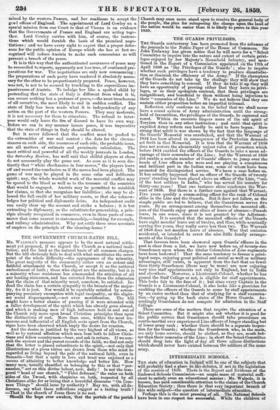THE GUARDS PRIVILEGES.
THE Guards controversy has been promoted from the columns of the journals to the Notice Paper of the House of Commons. Sir John Trelawny has given notice that he will move for a "Select Committee to inquire into the nature and extent of certain privi- leges enjoyed by her Majesty's Household Infantry, and men- tioned in the Report of a Commission appointed on the 12th of April 18.58 as 'the Privileges of the Guards ' ; also to inquire whether such privileges have a tendency to produce dissatisfac- tion or diminish the efficiency of the Army." If the champions of the Guards do not take up the challege they will show that they have something to conceal. If they do take it up they will have an opportunity of proving either that they have no privi- leges, or as their apologists contend, that those privileges are insignificant, and beneficial to them without being injurious to their "comrades of the Line." We do not believe that they can sustain either proposition before an impartial tribunal. Reflection only confirms us in the belief that we shall never have a sound system of Army administration until the strong- hold of favouritism, the privileges of the Guards, be captured and razed. Within its enceinte lingers more of the old spirit of Toryism than in any other institution ; and until that spirit is expelled Army reform can hardly be said to have begun. How strong that spirit is was shown by the fact that the language of the Guards' Memorial was unrebuked, and that the Warrant of 1854 has been altered in consequence of the Prietorian demands set forth in that Memorial. It is true that the Warrant of 1858 does not restore the abominably unjust rules of promotion which before 1854 enabled the officers of the Guards to take a mean ad- vantage of their eomrades of the Line ; but the Warrant of 1858 did enable a certain number of Guards' officers to jump over the heads of Line officers who were and are playing a conspicuous and brilliant part in the Indian war, some of whom have been promoted for distinguished service. We have a ease before us. It has actually happened that an officer of the Guards of twenty years' standing has been placed above an officer of the Line, "one of the best soldiers in India," who has served his country for thirty-one years ! That one instance alone condemns the 'War- rant of 1858. But there is a further case against that Warrant. Five years qualify a comm aiding officer for the rank of Colonel alike in the Line and the Guards. But it does not follow, as the simple public are led to believe, that the Guardsman serves five years. By an arrangement among themselves the mounted offi- cers of the Guards enjoy great slices of leave of absence—French leave, in one sense, since it is not granted by the Adjutant- General. It is asserted that the mounted officers of the Guards have eight months' leave out of twelve, and thus, while nominally serving five years, they really serve less than two. The Warrant of 1858 does not mention leave of absence. Was that omission accidental, or intended to cover the nice little family arrange- ments of the Guards ?
That favours have been showered upon Guards' officers in the past is clear from a list, we have now before us, of twenty-two Guardsmen upon whom the titular Colonelcies of Line regiments have been bestowed ! That the same tendency to favour a privi- leged corps, enjoying great political and social as well as military advantages, still exists, is apparent from the fact that no fewer than thirty Guardsmen (there may be more) are now enjoying very nice staff appointments not only in England, but in India and elsewhere. Moreover, a Lieutenant-Colonel, whether he has passed the Staff College or not, is eligible for staff appointments. This looks fair in the face of it ; but since every Captain in the Guards is a Lieutenant-Colonel, it also looks like a provision for enabling the officers of the Guards to come by staff appointments by an easier method than that of studying for a staff examina- tion—by going up the back stairs of the Horse Guards. Ac- cordingly Guardsmen do not compete for admission to the Staff College.
These are some of the matters that require the attention of a Select Committee. But it might also ask whether it is good for the public service that Guardsmen should take precedence on courts-martial over experienced Line officers of longer standing but of lower army rank ; whether there should be a separate inspec- tion for the Guards ; whether the Guardsmen who, in the main see only home service, should be clothed, as they are, muchbet!. ter than their comrades of the Line ; in short the Select Committee should drag into the light of day all those odious distinctions which should never have existed between the soldiers of the same army.


































 Previous page
Previous page